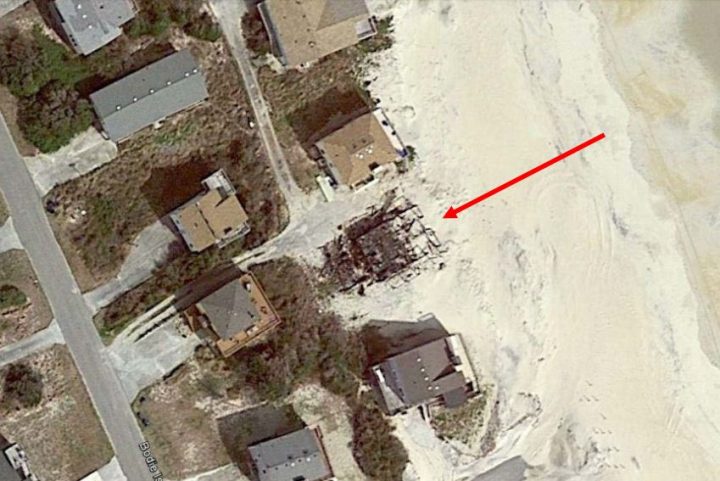
A Maryland couple’s ongoing challenge to North Carolina’s coastal regulatory authority, a case that a federal judge dismissed earlier this year, is pitting private property rights against decades of state coastal protections and reams of scientific studies on sea level rise and erosion.
The couple’s attorney says that information isn’t relevant to the federal appeals court case.
Supporter Spotlight
Michael and Cathy Zito of Timonium, Maryland, sued the state Coastal Resources Commission in 2019, alleging a taking of their property without just compensation. The CRC denied permits the couple had sought to rebuild a beachfront home destroyed by fire. The couple appealed after Judge James C. Dever III dismissed the case in March.
In late July, the Southern Environmental Law Center, representing the North Carolina Coastal Federation, filed with the 4th Circuit Court of Appeals an amicus brief supporting the commission’s regulatory authority. The federation is publisher of Coastal Review Online and has for decades advised policymakers on barrier islands’ natural processes and advocated for public access to beaches.
“The Coastal Federation seeks to protect the Coastal Resources Commission’s long-standing authority to manage the oceanfront in order to protect the right of the public to have access to sandy beaches that aren’t being destroyed by seawalls and over shadowed by houses that are about to fall into the surf,” said Coastal Federation Executive Director Todd Miller. “If successful, this case would undermine the ability of the Commission to protect the existing rights of the public to use our oceanfront beaches. The need to regulate oceanfront development so that it does not destroy our beaches grows more urgent each decade as increases in extreme weather and sea level occur.”
The federation had sought to intervene in the original case but the judge in dismissing the case denied the federation’s motion as moot.
The Zitos had sought to rebuild on the original house’s footprint on East Seagull Drive in Nags Head, where erosion eats away about 6 feet of beach each year. The CRC denied permits for the couple’s planned new home because it would not meet oceanfront setback requirements. The standard setback line for the property is 180 feet from the first line of stable vegetation. The Zitos’ planned home was about 12 feet landward of the static vegetation line.
Supporter Spotlight

The Zitos claim the commission’s decision left them with “an empty and useless lot,” according to court documents.
A spokesperson for the CRC said that because the case was in active litigation, staff would not comment for this report.
The Zitos are represented by the Pacific Legal Foundation, which characterizes the case as a fight against the state government’s “blurred lines on property rights” and a taking without just compensation.
“We sued in federal court because our primary claim is that the Commission has violated the Zitos’ federal constitutional rights. That claim is decided by federal law, not state law, and is thus appropriate for federal court adjudication,” J. David Breemer, senior attorney with the Pacific Legal Foundation, said in an email response to Coastal Review Online.
The foundation last week filed its response objecting to Southern Environmental Law Center’s addendum and a reply brief on the substance of the Zitos’ appeal.
Ramona H. McGee, a staff attorney with the law center, said the commission’s decision upholds North Carolina’s longstanding coastal protections and recognizes natural coastal processes.
“If there is anything to blame for a taking of property in this situation it is the Atlantic Ocean and natural processes. It is not an act by the Coastal Resources Commission,” McGee told Coastal Review Online last week. “Sea levels are rising, erosion is happening and those natural processes, naturally eat away at the coast and that’s what’s happened here. If this sort of takings lawsuit could go forward and be successful, it would undermine efforts on the part of responsible government agencies and others to protect natural areas and to prepare against continued erosion and the results of sea level rise,”
Although the Zitos did not object to the federation’s amicus brief, they filed a motion opposing as irrelevant an addendum that included all documents, legal decisions, study reports and scientific journal articles cited in the brief.
“The amicus material is not relevant because it has no bearing on the issue before the appellate court,” Breemer said. “The only issue is whether the commission is ‘immune’ from the Constitution’s requirement of just compensation for a taking. Submitting 500 pages of material that has nothing to do with that issue burdens the court and wastes everybody’s time.”
McGee, with SELC, countered that the material is highly relevant to the court’s decision.
“This really gets at how differently the Zitos view the case from the Coastal Federation and even the Coastal Resources Commission,” she said. “The Zitos’ takings claim has to be considered in the broader context of our state’s dynamic coastal processes and attendant coastal protections that have been around for decades. The Zitos instead are trying to frame their whole case as being really just this one private takings claim when, in reality, the whole point of our brief and these materials that we’ve offered to the court is to show that this case isn’t just about that one takings claim. This case has far-reaching ramifications.”
She said the Zitos are asking the court to “put on blinders to the broader context” and that the state’s entire coastal regulatory scheme would be “severely undermined” if the Zitos were to prevail.







